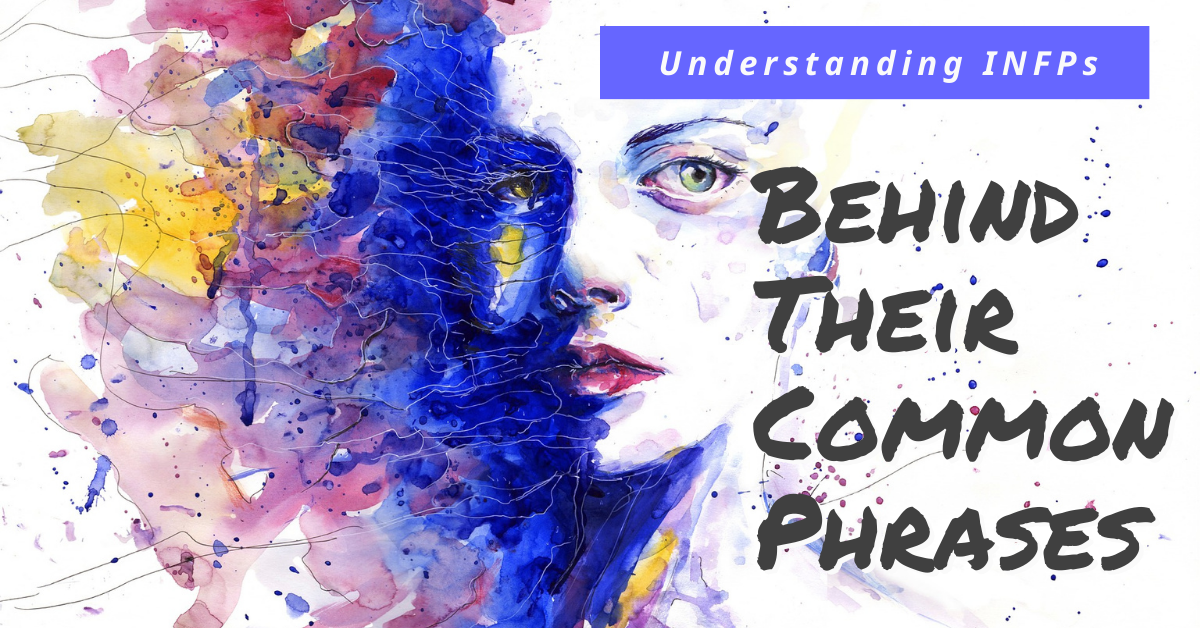INFPs and those around them can’t grow without awareness. Identity and understanding are core pillars of growth and reaching one’s full potential.
The Dreamer archetype or INFP represents a specific thought pattern that is innate from birth. They’re wired to have specific preferences which result in similar behaviors and traits.
It can seem pretty crazy that they say similar things, but it’s just a natural result of how they think.
INFPs are anything but direct, so let’s take a look behind the scenes for what they say. This will help bring INFPs awareness and help the rest of us to understand them.
Disclaimer
INFPs, I’m sorry in advance if any of the following seems too revealing and makes you feel vulnerable. I know you like your privacy.
But people cannot accept and appreciate you for who you are without understanding you first. Which is something you also want paradoxically.
I didn’t get you until I decided to help my INFP mom with her life struggles. It blew my mind because it’s so different from how I think as an ISTP.
All of your suffering and the things you’ve had to do to survive. Your gifts and potential. And now I advocate on your behalf to the world who expects you to be something you’re not.
I see you and I appreciate you.
#1 “I wonder…” or “What if…”
INFPs wonder about everything. They aren’t called the Dreamer for nothing. When they look at the world and it’s day-to-day happenings, they look beyond what’s in front of them to the possibilities of what could be.
Because of their ability to see the potential of things, it’s hard to be satisfied with what exists. This is what fuels their creativity and idealism. However, being overly idealistic can cause problems in their life.
Feeling let down is inevitable when things don’t live up to their expectations. If INFPs get struck in idealism too much, it leads to chronic disappointment and even depression.
But this also means that they see the potential of people and the world. They can help inspire others reach higher than they ever thought possible.
Great imagination is why their inner world is so rich and interesting. It’s why they make amazing philosophy and fiction authors. And it might be why they have trouble sleeping. Pondering what if’s puts their brain into flow.

#2 “I found something really cool out in the trash.”
Here’s their gift of possibilities at work again. Anything can be repurposed if you have enough imagination and creativity. So one man’s trash is another man’s treasure.
They bring random things home from flea markets, nature, curb-side garbage and other people’s unwanted stuff. They especially like to imagine the lives that were touched and meaning of antiques or used items.
Even if they don’t want something themselves, they see the possibility of someone else wanting that item. Their art is often eclectic and made from repurposed items or an interesting use of common items.
#3 “I forget what I was going to say.”
It’s not that INFPs are outright forgetful. It’s that every input or thought branches off in a million possibilities so it can be hard to stay on one train of thought.
That’s why you see them bouncing around in conversations or relaying seemingly unrelated points. It all makes sense in their heads. If they get too far off on a tangent, they have a hard time finding their way back to the point.
If this is in hyper mode or compounded with ADHD, they may only get out partial thoughts before jumping to the next. That can be really confusing to the receiver who might look at them with confusion.
If they’re talking to a group who turns away and changes topic, this can make an INFP feel invisible. This disconnect can cause feelings of rejection and frustration.
I’ve had to explain to my INFP mom when no one knows what she’s talking about. Sometimes she can’t even understand her own messages when looking back. She’s getting better since we’ve reduced her ADHD symptoms.
#4 “I can’t find my ______ and I’ve looked everywhere!”
My mom misplaces her keys, coffee, wallet and many other things on a regular basis. One time I found her keys laying in the backyard beside the shed with the mail.
I believe this stems from their constantly shifting focus due to the way their brain leaps around in a web of related ideas. This is also compounded if they have attention issues.
They can hear the microwave beep and think, “My coffee’s too hot, so I’ll let it sit a few minutes”. Then time goes by and something else grabs their attention. The coffee is “lost” but never actually left the microwave.
My mom’s also lost her keys a thousand times. Instead of always putting them in the same place, she puts them where she thinks will be a good place when she’ll go to need them.
That same thought process gets used for other items like important bills and RSVP invitations. She puts things in places that make sense at the time. But then she’s in a different frame of mind when the time comes and can’t find what she’s looking for.
This is where routines or systems can really help INFPs stay focused on the things that matter. Instead of wasting time looking for things needed to do that thing.

#5 “I’m just going to finish this one thing before I…”
INFPs really want to complete tasks, especially ones they’ve finally made the decision to take action on. This makes them feel accomplished which is something they struggle with.
Regardless of whether the INFP is telling themselves or someone else that they just want to finish something, they’ll likely underestimate the task or length of time for completion.
They might lose focus if something else grabs their attention — yet another common struggle. Once their brain starts wondering, it can be hard to stop.
However, if they’re in flow and really impassioned by what they’re working on, they can get sucked in until their motivation wanes.
Both jumping attention and hyper focus can derail an intension to move on to something else in a reasonable timeframe.
Because reality is an INFP’s blind spot, their time awareness and grasp of the physical realm quite frankly sucks. It plays a lot of tricks on them. This is why they’re often clumsy and always dropping things.
#6 “I lost track of time.”
Time is not an INFPs strong suit unless they’re into the meaning of seeing repeating numbers on the clock. Their excitement over seeing 2:22 might distract them from even noticing they’re late for something. lol
They use this phrase when they’re late to things, when they don’t accomplish a task on time and as a cover. The lines between these reasons can blur pretty easy.
I’ve lost count of how often my mom tells me that she’s lost track of time. I can tell when it’s sincere and when she says it for other reasons.
It can be used to be polite after being late to something they really didn’t want to go to but felt too guilty about backing out of. This is a combo of over commitment to others and possibly a change in mood.
They may do the same if they can’t get to a chore they said they would. Everyone who knows them knows they struggle with time, so it’s seems like a valid reason.
I can’t fault them in principle in some circumstances. It sucks being pulled out of flow for a prior scheduled engagement that now seems inconvenient or less interesting than what you’re working on.

#7 “Sorry.”
Sorry is the appropriate comment when someone feels genuinely apologetic about behaving incorrectly regardless of what type they are.
But INFPs (as well as some other Fi users) seem to use this a lot more than average. Be sure to take the pulse on the situation to see if you can determine the reason behind it.
Because these types are so in tune with emotions and don’t want anyone to feel bad, they may say sorry as a prevention mechanism. This is a natural way for them to maintain positive relations with others.
They are also conflict avoidant so they may actually say sorry to avoid a potential dispute. Unnecessary disharmony brings pain to themselves and others. This can be unproductive if a disagreement needs discussed.
Another reason to say sorry is because they want how others think of them to align with their self image. They’re afraid of being judged or others forming the wrong impression.
If an INFP says sorry chronically, it signifies self worth and esteem issues. These individuals are really insecure and may even be apologizing for being a burden or even just existing.
I believe this is a sign of trauma due to shame which often coexists with depression. Physical health issues often coincide because it’s all connected. This is something that can be overcome without anti-depressants.
#8 “I’m okay…”
If an INFP says, “I’m okay” when it’s obvious that something’s wrong, it means they’re privately processing or they’re being emotionally overwhelmed but really want to be okay.
Often times this is a necessary strategy until they can get home where they feel safe to allow the full depth of their emotions to come to the surface.
Outsiders don’t understand or feel the emotional intensity that is a constant companion for INFPs, leaving them feeling judged, shamed and deficient. Which compounds their emotional burden and may lead to trauma.
ISFPs, ENFPs and ESFPs experience this same struggle. But Fi Heroes feel it the most intensely.
If these types don’t allow their emotions to be fully expressed, they have to form coping mechanisms to try to deal with the pressure from inside.
I’ve noticed that Fi users usually turn to distraction, disassociation and/or numbing to deal with their repressed emotions. The longer they go unaddressed, the more likely the individual is experience mind, body and spiritual health issues.
#9 “I can’t help crying.”
Though INFPs try to keep their emotions to themselves, they can be caught off guard by a stong emotion or choose to let things show when they’re close to someone.
Types with high introverted feeling experience emotions extremely acute and intensely. Crying is often a byproduct of any emotion — even happiness.
If you’ve ever experienced such joy that makes you weep, know that this is the emotional intensity that Fi Heroes types feel quite often.
Almost anything that involves another being triggers their emotions. Sympathy and empathy stack on top of their own feelings. Creatures in their imagination are just as real as things in the physical realm.
They know that others do not feel as deeply or frequently and recognize when someone else is going through it. INFPs know their plight and can also embody the same emotions from similar past personal experiences.
They have emotions from a specific situation. That situation might also trigger a past memory that brings back how they felt before. And, they can put themselves in another’s shoes and feel as the other in their situation.
Because of this and their breadth of emotional nuances, it’s easy to see why INFPs identify as empaths.

#10 “I’m not in the mood right now.”
INFPs make decisions based on their emotions. And those can change from moment to moment.
Unless they feel a resounding YES when the time comes to do something, a part of them doesn’t want to leave their comfort bubble. If the other person cancels, they get to avoid feeling guilty for being the one to bail.
This is a constant struggle and why they don’t like making plans in the first place. The lack of inner alignment contributes to all Fi user’s motivation issues.
(I hesitate to write this because of the guilt it may cause. But if you address a problem now, you prevent future pain — best intensions, I promise.) I’m not sure if INFPs know how frustrating their changes in mood can be to others.
After so many “I don’t feel like it” type responses, can you blame people for saving their energy? INFPs don’t see it from that perspective. They get upset when they aren’t valued enough to be extended the invite.
If this is hard for someone to comprehend, they have a different way of thinking. And they likely value efficiency and effectiveness over how an action affects others.
#11 “I like being alone.”
INFPs are introverts to their core. They’re most comfortable in seclusion and their inner world. This is where they can dream freely and process their emotions without being judged by others.
Because INFPs care so much about others, they’ll often put someone else’s needs above their own. They don’t have to worry about this urge when they’re alone and can focus completely on themselves.
Self care is essential for the wellbeing of an INFP. Not having enough alone time can negatively impact their physical health. When alone they can do anything their heart desires and lose themselves in it.
Comfort is also really important to an INFP. They’d rather be at home or in a sacred spaced filled with the things they cherish. Things that are full of wonderful memories and have meaning.
If they don’t have their own space filled with the things they value, that is something that needs to happen before they can grow.
#12 “I don’t want to hold you up. Go on without me.”
INFPs are really critical about what they want for themselves and indecision can make that even harder to nail down. So they’d rather focus on others because they know they care intently about their needs.
That’s why they’ll tell someone to go on if they feel they’re holding them back. (FYI though, be careful of too much self sacrifice since it can turn into a martyr complex. This may also stem from trauma.)
My mom does this every time we are hiking and she’s either doddling over some plants or struggling up a hill. I don’t feel comfortable leaving her because of her clumsiness and lack of direction skills.
If we’re at an art museum I’ll tell her where to meet whenever she’s done and move ahead. That way she doesn’t feel pressured to keep up and can fully immerse in her appreciation for the art.
Want More?
I know this list isn’t all inclusive but I tried to pick the most common phases that INFPs use. If I missed a reason for why something is said, please enlighten us all. I’m not an INFP so I have to go based off input from them.
If you want me to elaborate further on something, just ask. Let me know down in the comments if you hear INFPs saying other things that you want deciphered.



Your comment is awaiting moderation.
brand inderal 20mg – clopidogrel generic order methotrexate 5mg pill